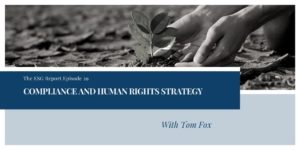
In this episode of The Ethics Experts, Gio welcomes Mauricio Escobar. Mauricio Escobar is a member of the firm’s Government Enforcement & Investigations team, as well as the firm’s Complex Commercial Litigation and Construction Litigation teams.

In this episode of The Ethics Experts, Gio welcomes Mauricio Escobar. Mauricio Escobar is a member of the firm’s Government Enforcement & Investigations team, as well as the firm’s Complex Commercial Litigation and Construction Litigation teams.
Department of Justice and Federal Trade Commission open public comment window – enforcement against illegal mergers.

Tom Fox has already established why he thinks compliance should be leading ESG programs. Today, he takes things in a different direction to discuss the role of compliance when crafting a strategy to tackle human rights violations in your business.
Human Rights Violations
Tom explains the three categories of human rights violations:
Obligations to Address Human Rights Violations
Both compliance and ESG have driven the discussion about the role of corporations in dealing with human rights issues. “Due to a statement by the Business Roundtable, companies are now being called upon to engage as responsible corporate citizens,” Tom states. Human rights should be considered a priority for multiple reasons; morality, legal considerations and soft laws, and reputation.
Crafting a Strategy
Tom highlights the three key decisions needed to determine and execute the proper strategy:
Compliance and Human Rights
“As human trafficking and modern slavery become more publicized, international companies must work to assess and manage risks through a human rights strategy,” explains Tom. This is something compliance professionals do every day; they manage risk! Tom cites this as the reason for his belief that compliance is uniquely suited to lead the corporate effort of addressing human rights violations.
RESOURCES
Tom Fox’s email
Does Your Business Need a Human Rights Strategy?
In this episode of the FCPA Compliance Report, I am joined by fan favorite Mike DeBernardis, partner at Hughes Hubbard. In this episode we look at compliance and temporal timeline developments from Q4 2021. Highlights of this podcast include:
Resources
Mike DeBernardis on HughesHubbard website.
Nearly six years ago, Matt Ellis writing in CCI, detailed some of the Foreign Corrupt Practices (FCPA) enforcement actions involving Pemex. He detailed the software company Paradigm BV which had a FCPA enforcement action based in part on consultant payments, gifts and travel expenses for a Pemex official related to a subcontract it performed on a Pemex project. Hewlett-Packard Company (HP) had a FPCA enforcement action, partly involving payments the company made to a technology consultant in connection with the sale of HP software packages and licenses to Pemex. Back in 2008, Siemens AG had the first billion dollar plus FCPA enforcement action including, among other things, the payment of approximately $2.6 million in bribes to a well-connected business consultant in Mexico, some portion of which allegedly was routed to a senior Pemex official to help the company resolve cost overrun issues related to three refinery modernization projects.
Since that time, it seems doing business with Pemex only became riskier under the FCPA due to apparent endemic corruption at Pemex. Key Energy Services, Inc. has a FCPA enforcement action caused by bribes from its Mexican subsidiary paid to a Pemex employee. However, this endemic corruption is not a new feature of doing business with Pemex as far back as 1982, Crawford Enterprises, Inc., Ruston Gas Turbines, Inc., C.E. Miller Corporation and International Harvester Company, had a FCPA violation for paying bribes to sell turbine compression systems to Pemex. Book-ending this early FCPA enforcement action, as late as 2020, Vitol Inc. was involved in paying bribes in violation of the FCPA. In short, doing business with Pemex has always been high risk.
Now a new FCPA risk may have arisen for US companies doing business in the US as Pemex purchased a massive Royal Dutch Shell refinery in Deer Park Texas (Shell Deer Park up to the sale, Pemex Deer Park, after the transfer.) According to Reuters, turnover of the refinery occurred in January as the deal finally passed Committee on Foreign Investment in the United States (CFIUS) review. (How this deal could pass CFIUS review is the subject for another blog post.) Now we have the anomalous situation of Pemex owing one of the largest refineries on the Gulf Coast. What could go wrong?
One only need to look at the Corpus Christi based Citgo Petroleum Corporation which is owned by Venezuela’s state-owned and state-controlled energy company Petróleos de Venezuela S.A. (PDVSA). According to a 2021 Department of Justice (DOJ) Press Release, Jose Luis De Jongh Atencio (De Jongh) while an official at Citgo Petroleum Corporation, laundered millions of dollars in bribes and corruptly provided business advantages to multiple individuals who obtained contracts with Citgo and PDVSA. He accepted more than $7 million in bribe payments from businessmen in exchange for assisting the businessmen and related companies in procuring contracts with Citgo and providing them with other business advantages.
Another case involving Citgo was Jose Manuel Gonzalez Testino (Gonzalez), who pled guilty in federal court in Houston to one count of conspiracy to violate FCPA, one count of violating the FCPA, and one count of failing to report foreign bank accounts. Yet one of the most interesting items was the reference to Citgo Petroleum Corporation and its involvement in the bribery scheme. As noted in the DOJ Press Release it stated, “Gonzalez also admitted to making bribe payments to several PDVSA officials who were based in Houston and employed by Citgo.” Citgo procured goods and services on behalf of PDVSA and “Gonzalez admitted he and his co-conspirators paid at least four Citgo officials in the Special Projects group and provided gifts and other things of value to a senior Citgo executive.” These Citgo/PDVSA enforcement actions have led nearly 20 different guilty pleas or indictments of other former Citgo/PDVSA employees.
Clearly, there is precedent for a FCPA enforcement action in the United States for a US domiciled business if that business has foreign government ownership. The President of Mexico, Andrés Manuel López Obrador, has taken a decided interest in this acquisition and George Baker, writing in the Houston Chronicle, notes this brings on what he calls the AMLO risk to this facility due to Obrador’s tendency to micromanage Pemex. His position on bribery and corruption is certainly well shown in his administration. In addition to his cutting of Pemex’s budget for repair and plant maintenance, what to you think Pemex and the AMLO administration think of compliance? Not much it appears.
What American companies now need to understand is that every transaction, every meal bought for Pemex Deer Park employees or gifts sent over will have to be screened through a FCPA lens. What happens when Pemex officials from Mexico start arriving to oversee their investment? What happens when Pemex officials in Mexico start to oversee and micromanage contracts and procurement? Given the number of FCPA enforcement actions involving Pemex in the past, would it be too surprising to see a repeat of Pemex employees’ actions at Pemex Deer Park?
What type of due diligence is your American company going to engage in for doing business with Pemex Deer Park? Leaving aside the question of what the financial health of the plant will be under the AMLO regime, what about anti-corruption due diligence? Could Pemex pass such scrutiny or would too many read flags arise? What happens if your company is approached to enter into some type of joint or other business relationship with Pemex Deer Park?
What about training? If you are a US company which has only done due diligence with US owned petro-chemical and chemical plants on the Texas Gulf Coast, you have probably never received FCPA anti-corruption training. Now you will need to do so. You will also need to track all your gifts, travel and entertainment expenses with Pemex, with a separate line item entry in your books and records.
All of these issues and questions will be answered as we move forward into the almost brave new world.